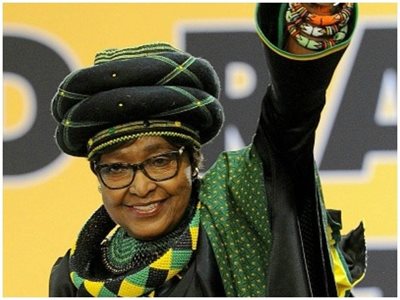Winnie Mandela (1936–2016)
 Winnie Madikizela-Mandela was born in 1936 in South Africa. Her father was a local history teacher who later worked for the local government. Her mother taught science. Winnie was one of nine siblings. When she was 9 years old, she had an experience that would influence her trajectory in life. World War II had ended, and there was to be a celebration in her town. When she and her family arrived, they were not permitted to enter because the event was for Whites only. This opened her eyes to the injustices in her society. She had more similar experiences in her childhood and youth, and they left an imprint on her.
Winnie Madikizela-Mandela was born in 1936 in South Africa. Her father was a local history teacher who later worked for the local government. Her mother taught science. Winnie was one of nine siblings. When she was 9 years old, she had an experience that would influence her trajectory in life. World War II had ended, and there was to be a celebration in her town. When she and her family arrived, they were not permitted to enter because the event was for Whites only. This opened her eyes to the injustices in her society. She had more similar experiences in her childhood and youth, and they left an imprint on her.
Winnie excelled in school, permitting her to continue her studies, which was not an option for all Black children. She began to develop leadership skills in high school, and after graduation in 1953 she was accepted at the Jan Hofmeyr School of Social Work in Johannesburg. While studying in Johannesburg she experienced the full effects of apartheid and began to visit the famous Black township of Soweto.
Winnie finished her social work studies in 1955. Because she did so well, she was awarded a scholarship to study in the United States, but she ultimately decided to stay in South Africa to work as a social worker in Baragwanath Hospital. She was the first Black person to hold such a position. Winnie became engaged in political activism and research about issues of social justice. She used her social work skills and knowledge to look at infant mortality rates in the townships.
She married Nelson Mandela in 1958, and they moved to Soweto to live and work. Nelson continued his work with the African National Congress (ANC), and Winnie continued her activism as well. Their home was a gathering place for antiapartheid work and also the target of frequent police raids because of that work.
...
Her life was not without its ups and down. Winnie’s frequent arrests, her banishment, and the harsh interrogations took a toll on her mental health and her worldview. She became much more militant in her work to end apartheid. People accused her of supporting the practice of necklacing, a form of torture leading to severe burns and often death. An organization that she founded and supported was accused of kidnapping young people who opposed it.
In 1990 Nelson was released from jail. The couple had the charisma of celebrities as they traveled giving speeches and meeting people. She was appointed the head of social welfare for the ANC at this time. At the same time, she was held for trial for the killing of a kidnapped youth. She eventually received a punishment of 2 years suspended sentence. She continued her work in social welfare, but she began to be marginalized from the center of the work. She was accused of financial irregularities. She and Nelson grew apart and separated in 1992 and divorced in 1996.
Winnie was brought before South Africa’s Truth and Reconciliation Committee, where Archbishop Desmond Tutu begged her to admit to mistakes that she had made. She made the admission, and she apologized to those who were negatively affected by any decisions she made or any organizations that she began.
Winnie continued to advocate for causes important to her, such as the rights of people with HIV. But Winnie mostly retreated from public view until her death in 2016.
Bibliography
Bezdrob, A. M. (2003). Winnie Mandela: A life. Zebra PressBridger, E. (2015). From ”Mother of the Nation” to ”Lady Macbeth”: Winnie Mandela and perceptions of female violence in South Africa 1985–91. Gender & History, 27(2), 446–464.
City of Johannesburg. (2018). Winnie: Soweto's most famous lady. https://www.joburg.org.za/play_/Pages/Play%20in%20Joburg/Joburg%20Vibe/links/Famous%20Joburgers/links/Winnie-Soweto's-most-famous-lady.aspx
South African History Online. (n.d.) Winnie Madikizela-Mandela. https://www.sahistory.org.za/people/winnie-madikizela-mandela
Biography.com Editors. (2020). Winnie Mandela Biography. https://www.biography.com/activist/winnie-mandela
Hassim, S. (2018). Not just Nelson’s Wife: Winnie Madikizela-Mandela: Violence and radicalism in South Africa. Journal of Southern African Studies, 20(44), 895–912.
Madikizela-Mandela, W., & Kathrada, A. (2014). 491 days: Prisoner number 1323/69. Ohio University Press.
Mandela, W. (1985) Part of my soul went with him. W. W. Norton.
Quartey, K., & Thomas, H. E. (2018). Tribute to Winnie Madikizela-Mandela. Journal of Pan African Studies, 11(7), 45–45.
For the full review, references, and additional publications, click here.
